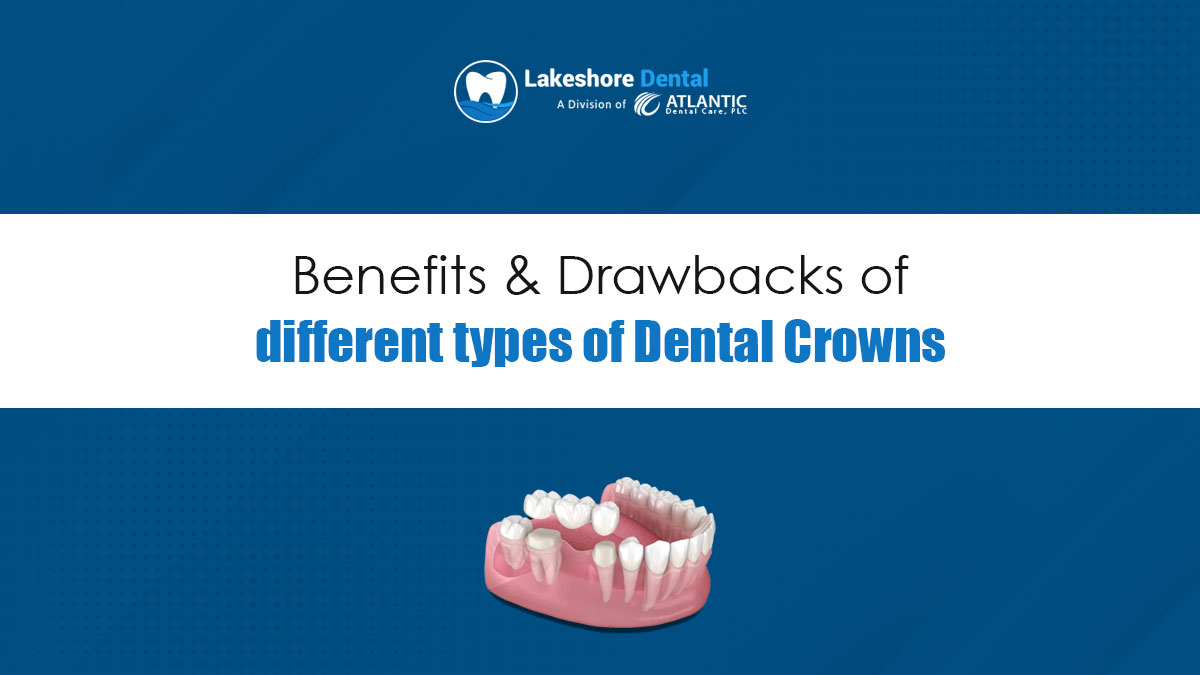
Dental crowns are a type of dental restoration that is used to cover a damaged or decayed tooth. They are designed to look and feel like a natural tooth and can be used to improve a tooth’s appearance, strength, and function. Several different types of dental crowns are available, each with its own benefits and drawbacks. In this blog, we will discuss the different types of dental crowns, their benefits, and their drawbacks.
Types of Dental Crowns
There are 3 main types of dental crowns: porcelain-fused-to-metal crowns, all-ceramic crowns, and all-resin crowns.
1.Porcelain-Fused-to-Metal Crowns
Porcelain-fused-to-metal crowns are the most common type of dental crown. They are made of a metal base covered with a layer of porcelain. This type of crown is strong and durable and can be used to restore a tooth that has been severely damaged or decayed.
2.All-Ceramic Crowns
All-ceramic crowns are made entirely of ceramic material. They are designed to look and feel like a natural tooth and are a good choice for people looking for more natural-looking restoration.
3.All-Resin Crowns
All-resin crowns are made of a plastic material designed to look and feel like a natural tooth. They are less expensive than other types of crowns but are less strong and durable.
Benefits of Dental Crowns
Dental crowns have several benefits, including improved appearance, strengthened tooth structure, and improved bite.
1.Improved Appearance
Dental crowns can improve the appearance of a damaged or decayed tooth. They are designed to look and feel like a natural tooth and can be used to restore a tooth’s natural shape and color.
2.Strengthened Tooth Structure
Dental crowns can be used to strengthen a damaged or decayed tooth. They can be used to restore a tooth’s structure and help prevent further damage or decay.
3.Improved Bite
Dental crowns can improve the bite of a damaged or decayed tooth. They can be used to restore the natural shape and function of a tooth and can help to improve the Overall function and chewing capacity of a person.
Drawbacks of Dental Crowns
Although dental crowns have many benefits, there are also some drawbacks. These include cost, wear and tear, and sensitivity.
1.Cost
Dental crowns can be expensive, and the cost can vary depending on the type of crown used. All ceramic crowns are typically the most expensive, while all-resin crowns are the least costly.
2.Wear and Tear
Dental crowns can wear down over time and may need to be replaced after a few years, and this can be costly, and may require additional visits to the dentist.
3.Sensitivity
Dental crowns can cause sensitivity in some people, and this can be due to the material used in the crown, or due to the placement of the crown.
Conclusion
Dental crowns are a good way to restore a damaged or decayed tooth. They can improve the appearance, strength, and function of a tooth and can help to improve the overall bite of a person. However, dental crowns have some drawbacks, including cost, wear and tear, and sensitivity. It is essential to discuss the pros and cons of dental crowns with your dentist before making a decision.

